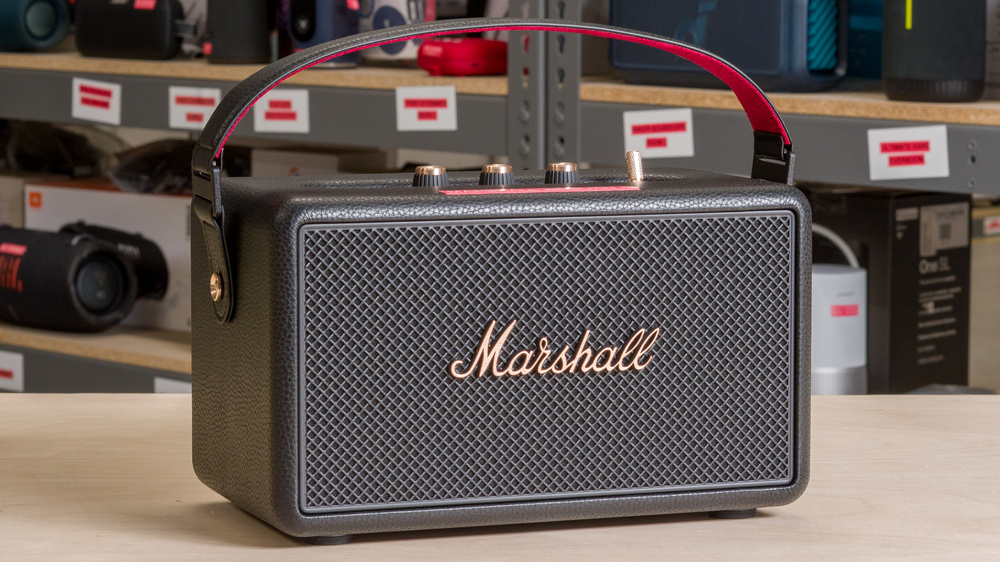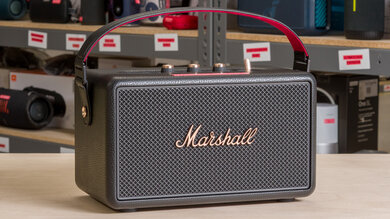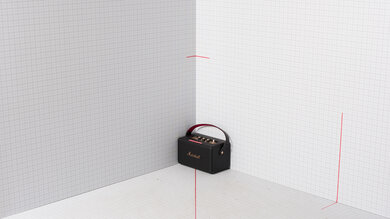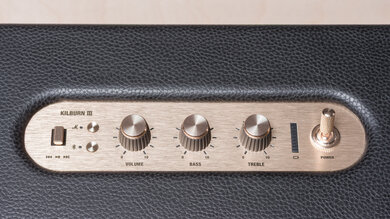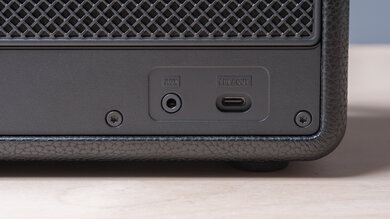The Marshall Kilburn III is the third generation of a popular mid-sized speaker from the revered British amplification company. It features visual appointments that draw from Marshall's rock 'n' roll lineage, including tolex construction, brass cap knobs, and the classic white script logo in the center of the speaker grille. Boasting an IP54 rating, LC3/Auracast compatibility, and what the manufacturer calls 'True Stereophonic' tech for a 360-degree sound, the feature set seems to indicate this speaker has the substance to complement its distinctive style.
Our Verdict
The Marshall Kilburn III is a good speaker for music. It has a relatively balanced default frequency response that slightly accentuates the mid-range, making it a good fit for vocal-centric tracks in genres like rock and country. If you're not a fan of the default sound, you can use the in-app EQ or bass/treble knobs to tailor the sound to your liking, and there's even a placement correction feature to optimize the sound to your environment. While there's some bass on tap, the bass range doesn't extend too low, resulting in more thump than rumble. The wide, even soundstage is a high point, ensuring consistent audio delivery across a range of listening angles. The dynamics performance is decent too, as this speaker can get quite loud without compressing and compromising the audio quality.
Plays back stereo content with great directivity.
Graphic EQ, presets and placement correction in app.
Some compression at max volume.
The Marshall Kilburn III is an okay choice for soundtracking videos and movies. Latency with both Android and iOS devices is relatively low, so you likely won't experience any AV desync issues if you pair it to your phone. Its mid-focused sound makes it a versatile companion to most video content, though it's better-suited to dialogue-driven TV shows than action-packed blockbusters due to its lack of bass extension. Still, it can get loud enough to soundtrack movie night in a larger space, if needed, and the impressive directivity means everyone in the audience will experience similar audio delivery.
Plays back stereo content with great directivity.
Graphic EQ, presets and placement correction in app.
Some compression at max volume.
LC3/Auracast compatibility can still be spotty.
The Marshall Kilburn III is a great choice for podcasts. Its mid-range-focused sound really helps bring out the sound of your favorite podcast hosts' voices, and it can get loud enough for the conversation to carry in larger rooms. Transporting it from place to place is a breeze, thanks to the speaker's portable design and built-in carrying strap. Plus, the excellent directivity means you don't have to worry about how you orient yourself around the speaker: you'll be able to follow the narrative from all angles.
Long, 23-hour battery life.
Lightweight, portable design.
Some compression at max volume.
The Marshall Kilburn III lacks a built-in mic and voice assistant capabilities.
The Marshall Kilburn III is a great outdoor speaker. It's well-constructed from quality materials, and its portable design and comfortable carrying handle make it easy to take on the go. While its battery life doesn't live up to the manufacturer's advertised figure of 50+ hours, we measured a little over 23 hours, which is still very respectable. It's likely you'll be able to get closer to the advertised figure by listening at lower volumes. The IP54 rating means you won't need to baby it too much on camping trips, though it's best to keep it away from bodies of water. Its excellent directivity and balanced sound mean everyone will experience similar audio quality, regardless of where they're positioned.
Long, 23-hour battery life.
Lightweight, portable design.
Some compression at max volume.
Changelog
-
Updated Dec 09, 2025:
The Portability box was corrected to state that the power source is a battery and USB. We retested the speaker at low volumes in response to user comments about the high noise floor, and added text to the Frequency Response Accuracy section.
- Updated Aug 04, 2025: Review published.
- Updated Jul 28, 2025: Early access published.
- Updated Jul 21, 2025: Our testers have started testing this product.
Check Price
Differences Between Sizes And Variants
The Marshall Kilburn III comes in two different color variants: 'Black and Brass' and 'Cream' (here's a picture of its label). We tested the 'Black and Brass' variant, but expect other color variants to perform similarly. If you encounter another variant of this speaker, please let us know in the comments.
Popular Speaker Comparisons
The Marshall Kilburn III is the next generation of the Marshall Kilburn II. There are some notable upgrades from the previous iteration, as the Ingress rating has been bumped up from IPX2 to IP54, adding dust protection and resilience against water splashes. Although we haven't tested the Kilburn II, the manufacturer advertises that the battery life has more than doubled with the Kilburn III. If you're a fan of the classic Marshall livery and want something that can go up to 11, it's worth checking out the Marshall Woburn III too. While this speaker needs to be plugged in to function, it makes up for this with a much louder max volume and a more balanced frequency response. That said, its directivity isn't as good as the Kilburn III, and its hefty frame means it's not a portable option. If you're not a fan of the Marshall's nostalgic aesthetic, you can also take a look at the Bose SoundLink Max. It's similarly portable but features an IP67 rating and more robust wireless connectivity options. If you love the vintage-inspired look but want something you can park in your living room, the JBL Authentics 500 can get even louder and has a more balanced default sound profile.
See also our recommendations for the best portable Bluetooth speakers, the best Bluetooth speakers for bass, and the loudest Bluetooth speakers.
The Marshall Kilburn III and the Bose SoundLink Max are both great portable options for Bluetooth speakers, but there are slight differences that can influence a buying decision. The Bose is sturdier, boasting an IP67 rating for submersion in water. It has a better app too, which allows you to simply pair other SoundLink Max speakers in stereo or party mode configurations without using Auracast. That said, the Marshall has better directivity and a longer battery life that stretches close to the 24-hour mark. Ultimately, both speakers have balanced frequency responses and excellent portability, so your decision could come down to any of the above, or even their very different aesthetics.
Whether you should choose the Marshall Kilburn III or Marshall Middleton II depends on your primary usage. The Kilburn III has a longer battery life with a warmer and fuller bass range. It also offers a higher output level and less compression. It offers room correction in addition to EQ tools. Although well built, it's not as portable as the Middleton II, which is smaller with a higher IP67 rating. The Middleton II also has a mic for taking phone calls. It has decently flat tuning, but it's not as boomy. You can EQ it to taste, but keep in mind that its lower max output means that bass frequencies tend to compress a bit more compared to the Kilburn III as you raise the volume. Still, its small size doesn't compromise the soundstage, and it fits more easily into a backpack for on-the-go.
The Marshall Woburn III is a great alternative to the Marshall Kilburn III if you're looking for a speaker to park in one place and value audio fidelity. While it's entirely mains powered, it makes up for it with a very balanced sound and a very loud max volume. That said, the Kilburn III is a better choice if you value on-the-go use, as it's highly portable and features an almost 24-hour battery life. It also has better directivity, so you enjoy the sound equally well from different listening angles.
The Marshall Emberton II is more portable than the Marshall Kilburn III, which will likely be its main selling point. It's extremely easy to sling into a backpack or tote bag. It also has better directivity and extremely low latency with iOS and Android devices, which is great if you need an impromptu audio accompaniment to a YouTube video. When it comes to sound, the larger Kilburn III is a more enticing proposition. It has a more balanced frequency response and can get louder without compressing as much at max volume. It also has a marginally longer battery life, which can come in handy for long camping trips.
Test Results

As with other Marshall speakers, the Marshall Kilburn III draws from the visual pedigree of Marshall's famous guitar amplifiers. The enclosure is made of black tolex, with a metal mesh grille covering the drivers at the front. A black leather strap arcs over the top, contrasted by a red velvet underside that's easy on the hands. Even the brass cap knobs are consistent with the classic 'British Invasion' era Marshall look, pairing well with the anodized gold control panel.
It's a very portable speaker. It's around the size of a large lunchbox, with a convenient carrying handle that makes it easy to bring to and fro. The lightweight design means that you can easily carry it in one hand. Plus, it runs on batteries, so there's no need to rely on wall power.
The Marshall Kilburn has a very good build quality. It boasts an IP54 rating against water splashes and dust. While this isn't quite on par with more rugged outdoor speakers, like the IP67-rated Bose SoundLink Max, it's a step up from the Kilburn II's IPX2 rating. The speaker stands atop plastic and rubber feet, which keep the tolex-covered enclosure stable. The faux-leather carrying strap seems sturdy and resilient, as does the metal mesh covering the drivers.
The controls are located on the top panel of the speaker. The anodized gold control panel houses three brass cap knobs (bass, treble, and volume), as well as two buttons, a sliding switch, and an old-school toggle switch for the power. There's also a volume meter that's synced to your Bluetooth device. All in all, the controls are responsive and laid out in an intuitive way that mimics the controls of a guitar amp. Having the 'Marshall' button to cycle between two EQ presets is a nice, convenient touch, too. The LEDs used to indicate levels are a touch dim, though, especially in brighter environments, and some folks might prefer to have audio feedback (beeps) after inputting controls.
The Marshall Kilburn III has a decent frequency response accuracy. With the 'bass' and 'treble' controls set to their default '5,' this speaker has a balanced, musical sound. It doesn't extend as low in the bass range as larger speakers, like the Marshall Woburn III, but there's plenty of thump and boom in the bass range to bring out the double kicks in metal tracks. There's some slight over-emphasis in the mid-range that helps bring out chunky rhythm guitars and growly vocals, too. The treble range is very balanced, rendering sibilants, like cymbal crashes, in an even and pleasant way.
You can use the placement compensation function via the app to compensate for any reflections caused by being close to a wall or an edge; however, we didn't utilize this for our frequency response results, as we placed the speaker in the center of a table in the middle of the room. This graph demonstrates how these settings affect the frequency response in this positioning. We also took measurements with the edge setting enabled, with the speaker positioned at the edge of the table. The app also offers a variety of EQ presets, which can be further customized using the 'bass' and 'treble' controls. So if you enable the 'Bass Boost' preset, you can increase the bass even further by cranking the bass knob.
In response to a comment, we retested the speaker and confirmed that at low volumes, it introduces distortion in the bass range. This doesn't occur at higher volumes, though, which suggests it's due to a DSP algorithm designed for higher output volumes. We're investigating ways to fully measure and detect similar issues in the future.
This speaker has an excellent stereo soundstage performance. The manufacturer claims to use 'True Stereophonic' tech to create a 360-degree sound, despite it lacking a 360-degree cylindrical design like the Ultimate Ears EPICBOOM. Still, this speaker has great directivity, almost on par with the Ultimate Ears, meaning you'll be able to enjoy an even sound from many different listening angles. It can play stereo audio without downmixing to mono, too.
The Marshall Kilburn III has a decent dynamics performance. It can get quite loud for its size and, while there's some compression in the bass range at higher volumes, it doesn't significantly impact audio quality.
Although the battery life falls short of the manufacturer's advertised figure of 50+ hours, it's still outstanding. We were able to achieve just shy of 24 hours without a recharge, which is effectively an entire day of playback. There are several options designed to help preserve your battery health long term, too, as you can enable Battery Preservation modes that limit the battery to 90%, lower the charging speed if it gets too hot, or throttle the charging speed. That said, there's still a quick charging feature you can use to get eight hours of playtime from a 20-minute charge. You also have the ability to change auto-off time increments and charge your devices via the USB-C port.
The Marshall Bluetooth app gives you control over some useful parameters like a graphic EQ and presents, placement compensation, and battery preservation. You can also re-map the 'M' or 'Marshall' button to a limited range of functions. Check out how the interface works in our app video. While there's no party mode, as there has been with other Marshall products, there's support for pairing other speakers via LC3 including Auracast.
You can connect devices to this speaker using a traditional 3.5 mm/1/8" cable for wired playback.
The Bluetooth connectivity is excellent. This speaker supports multi-device connectivity, so you can keep up to two devices connected. Latency is decently low with both iOS and Android devices, too, so you won't experience much in the way of sync issues between your audio and video if you use it to soundtrack videos.
There's support for LE audio over the LC3 codec, which works well if you own a compatible device. While there's also support for Auracast, it can be inconsistent, as we struggled to pair it with other speakers via Auracast. It's worth noting that this technology is still in its infancy, though, and it's possible that bugs like these will be ironed out in future firmware updates.
